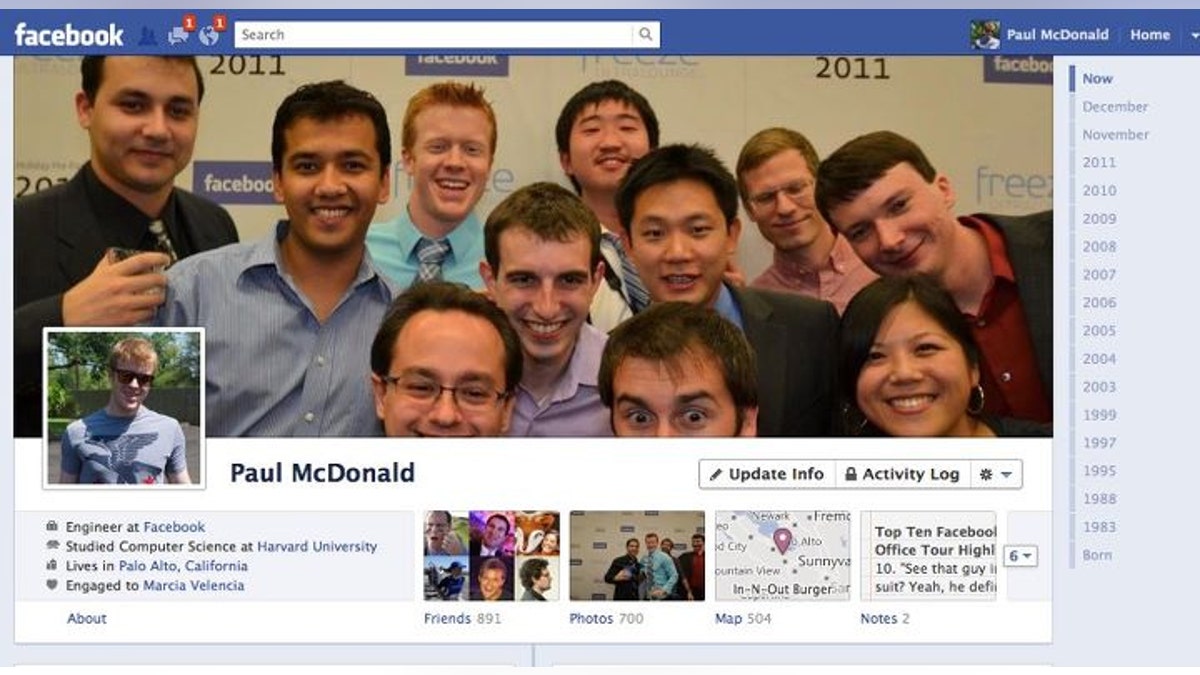
Facebook's biggest makeover to date, called Timeline, went live worldwide in September 2011. (Facebook)
You are not the sum of all your Tweets -- no matter what the advertisers wish.
With Google's announcement that it's going to coordinate all the data it collects on you and Facebook's personal Timeline creeping its way across the Web, there's been a lot of hand-wringing about the lack of security and the loss of privacy on the Internet.
What often goes unnoticed is that these efforts to turn our lives into fodder for ad executives are failing.
The unchecked, unsecured, and unregulated collection of our personal information is a well-documented, undeniable problem. It threatens the safety and security of our children, promotes identity theft and fraud, and leaves our personal safety at risk -- all facts that many companies in Silicon Valley purposively ignore. Such was the case recently when Path, a social networking app, was caught secretly collecting personal contacts and address books from people's phones.
But the ostensible purpose of collecting all this data -- to create successful ad campaigns -- probably isn't working.
The fantasy was that by using this personal data, companies could pitch products directly to individuals, and only those products those individuals wanted to buy. That one-to-one marketing hasn't worked out; it's too costly and inaccurate.
Behaviorial marketing is another approach that essentially follows you around the Web, as Google and Facebook attempt to do. Based on your digital trails -- or a whole bunch of people like you -- a program guesses what your secret desires are and tries to cater to them. Of course, this is ineffective as well. Just because I mention Whitney Houston in an e-mail or read The Christian Science Monitor doesn't mean I'm ever going to buy "The Bodyguard: Original Soundtrack Album" or join Christian Mingle.
Targeted marketing is also a fallacy: You follow a curling team's page on Facebook and search for hockey scores on Google, and suddenly you're Canadian?
Personal identity isn't simply the sum total of all your Tweets, Flickr photos and misinterpreted Facebook witticisms.
The deeper reason for these failures of data mining to plunder personal information is that in a very important sense, you are not your Facebook Timeline. No one is.
Look closely at your own Timeline or a friend's Timeline on Facebook and you'll see what I mean. There are ambiguous posts, pictures from lost vacations, cross postings by friends, news story links, family snap shots, even games you played. There are also probably tagged photos that aren't actually of you and listings of events that you never in fact attended. But the point is that you are not merely a collection of such digital detritus.
Philosophers call this the problem of personal identity. More precisely, it is one of the problems of personal identity, namely, what are the essential elements that make you, you? In other words, what are the necessary and sufficient conditions that are required to say of you that the person you are now is the same person who once sat in Mrs. Butowski's class in fourth grade or scored the winning basket at the senior game or played sax in a punk band? Pinning down exactly what is at the core of personal identity over time -- memory, consciousness -- isn't easy.
From Plato to Parfit, philosophers haven't been able to satisfactorily answer the problems of personal identity, so don't expect me or any Facebook programmers to do so either. But we can say what personal identity isn't: It isn't simply the sum total of all your Tweets, Flickr photos and misinterpreted Facebook witticisms. So no amount of data mining is ever going to deliver a solution.
Marketers and programmers may say, that's fine. We don't need to be that precise. Just knowing you bought a Radiohead CD with an American Express card is good enough to put an ad in your e-mail for the new Foo Fighters disc and assess your credit worthiness. But that's far short of the fantasy that Google sells to advertisers, and what Facebook promises to deliver to future stock holders.
More important, these over-hyped marketing fantasies continue to expose us all to the dangers of collecting all this information without oversight. Insurance companies can discriminate against you based on false information online. You can be turned down for a job or a mortgage based on postings by someone you don't even know on Twitter or Facebook.
Rejecting targeted marketing, some firms have seen a renaissance of so-called "branding," the sort of old-fashioned advertising intended to burn a company name into the public consciousness. But for branding to work, tech companies need to instill trust in consumers, and there's precious little of that to go around these days.
For several years, high tech investors, start-ups, and Silicon Valley panjandrums have espoused something I like to call the thief's motto: "Ask for forgiveness, not permission." In other words, take what you want and if anybody complains, then apologize. When all that they were peddling was Pointcast screen crawls and memory upgrades, that may have worked. But now that many people's entire lives -- banking, dating, and work -- are online, it's time those companies grew up and adopted a different motto.
Follow John R. Quain on Twitter @jqontech or find more tech coverage at J-Q.com.
